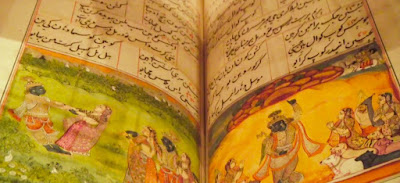 |
| July 16, 1945, Trinity, the first nuclear weapons test. |
The film Oppenheimer was a big hit this summer and if you saw the film and especially if you read the book it is based on, American Prometheus, you know that there are some literary references. Two that influenced him were the poetry of John Donne and the Hindu scripture Bhagavad Gita.
Both were important to him during the Manhattan Project and at the Trinity test. In 1962, Manhattan Project leader Gen. Leslie Groves wrote to Oppenheimer to ask about the origins of the name Trinity. Oppenheimer said, “Why I chose the name is not clear, but I know what thoughts were in my mind. There is a poem of John Donne, written just before his death, which I know and love.”
Oppenheimer quoted the sonnet “Hymn to God, My God, in My Sickness” which is about a man unafraid to die because he believed in resurrection.
Oppenheimer continued, “That still does not make a Trinity, but in another, better known devotional poem Donne opens, ‘Batter my heart, three person’d God.’ Beyond this, I have no clues whatever.”
That second poem,“Batter My Heart,” expresses the paradox that by being chained to God, the narrator can be set free.
Oppenheimer wanted to read the Bhagavad-Gita in the original Sanskrit, the primary sacred language of Hinduism. Before Los Alamos, when he was a professor at Berkeley, he audited Sanskrit classes with Arthur W. Ryder, who had published an English translation of the Bhagavad-Gita.
The "Bhagavad-Gita" expresses a life structured by action. One should detach from desired outcomes and work. Preparing for Trinity, Oppenheimer’s thoughts were on the success of the test and the impact of the bomb on his life and the world.
As you see in the film, at the Trinity detonation, Oppenheimer was said to have recalled the line from the book, “Now I am become Death, the destroyer of worlds.”
However, some critics have said that the quote has been widely misinterpreted. Oppenheimer is not Krishna/Vishnu, not the terrible god, not the ‘destroyer of worlds’ — he is Arjuna, the human prince who didn’t really want to kill his brothers, his fellow people but he has been enjoined to battle by something bigger than himself.
Historian James A. Hijiya wrote that Oppenheimer believed, “It was the duty of the scientists to build the bomb, but it was the duty of the statesman to decide whether or how to use it.”
Before the Trinity test, Oppenheimer sipped coffee, rolled smokes, and read French poet Charles Baudelaire. T.S. Eliot was another poet Oppenheimer admired. He met Eliot when he invited him as the director of the Institute for Advanced Study in Princeton. Eliot wrote, “Do I dare / Disturb the universe?”
Follow this blog for all things poetry.
To see our past prompts and more than 300 issues,
visit our website at poetsonline.org
from Poets Online - the blog https://ift.tt/pUL2lTt







